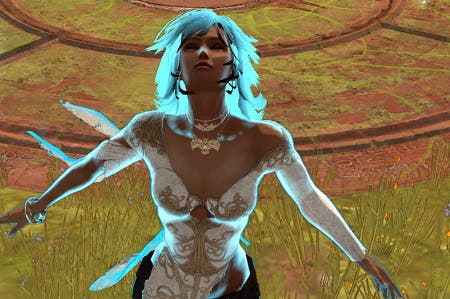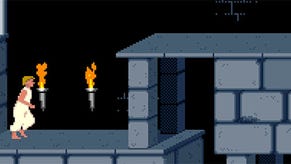Retrospective: Prince of Persia
The prince and the unpopular.
On paper, 2008's Prince of Persia revamp was a pointless game. Don't get me wrong, it had every reason to exist, but its story and mechanics were essentially a long, meandering path back to square one.
Critics and players alike took the game to task for a Prince who didn't so much walk the fine line between rogue-ish charm and loudmouthed dickery as he did wall-run right over it and into Nathan Drake's dirty, half-tuck-stained laundry. He never grew or changed, they said. Worse, he overshadowed the far more interesting Elika, whose grim determination to face her self-sacrificing destiny felt far more at home in POP's equal parts desolate and gorgeous world. And then there was the structure of the game itself, which - among other alleged crimes - traded Death's cold touch for an omnipresent helping hand from Elika. That's right: the Prince couldn't die.
He also, incidentally, wasn't really a prince, which resulted in a chorus of cries from the same folks who get all bent out of shape when they realise that Apple Jacks don't taste like apples.
Regardless, where's the fun in playing an unlikeable, unchanging main character? And with the looming threat of death out of the picture, why even hand me a controller in the first place? The Prince may as well be out for a slightly-more-apocalyptic-than-usual evening stroll - you know, up the side of a building. However, while I acknowledge that Prince of Persia had its fair share of shortcomings, I wouldn't have loved it nearly as much - or, for that matter, at all - if its two most glaring 'flaws' weren't part of the package. The point, so far as I'm concerned, was pointlessness.
From the get-go, the Prince was self-serving, and intentionally antagonistic. He showed up sniffing for gold and ended up chasing tail instead. All throughout the adventure, his go-to line was a melodramatically sigh-stuffed "How did I get myself into this?" I couldn't stand the guy. His game was a high-flying rollercoaster ride through a world one part Ico and 37 parts Okami. He himself, however, was a chore, an out-of-place Nathan Drake clone (voiced, of course, by Nolan North) with precisely none of the charm.
But he was also different. Gaming's past is littered with goodie-two-shoes. Nowadays, meanwhile, edgy anti-heroes are all the rage. But even Renegade Shepard has (so far) managed to save the universe. The Prince, meanwhile, rendered all of Elika's self-sacrifice - and pretty much the entire game - moot by re-releasing the dark god Ahriman, aka the apocalypse just before the credits rolled. Why? Because locking away everyone's favorite world-ending sensation that was sweeping the nation required Elika's death, and when faced with a choice between the whole of humanity and one girl he was crushing on, he picked the girl.
That whole dynamic was made all the more convincing by the Prince's special brand of immortality. If his back was against the wall in combat Elika would channel the powers of a million glowsticks to warp him to safety. If he leaped into one of the game's many colourful, rather pleasant-looking infinite abysses, she'd quickly clasp his hand and bring him back from the brink.
The quiet physicality of their relationship spoke volumes. It was, of course, inspired by Ico, but there are far worse teachers from which to take lessons in believable sincerity. Most games tell us that Lead Male and Lead Female would very much like to play a particularly contact-heavy game of tonsil hockey - usually about five seconds before they proceed to do so. Prince of Persia, however, embedded that attraction into platforming's very core.
Elika regularly saved the Prince, and - if he was nearby - the Prince would gently catch Elika if she was dropping off a ledge or let her hold onto his back while his Man Arms delivered them across some precarious web of vines. Banter-filled dialogue, on the other hand, gave those actions motivation - even if, in the Prince's case, they weren't exactly pure-hearted or altruistic. It was an intelligent use of both show and tell, which also managed to explain away (though not radically alter) game tropes like double-jumping and constant death with magical realism.
And so, love him or hate him, you can't claim that the Prince ever pretended to be something he wasn't. He started out a thick-skulled, self-serving jerk, and pretty much stayed the course in both word and deed. Instead of trite character transformation, the Prince's feelings for Elika emphasised his ugliest flaws. He wouldn't even let Elika take matters into her own hands and save everything she held dear because he had the gall to think he knew better. "Why?" she asked wearily as he scooped her off her Snow White-esque death display table. He merely kept on walking without a word.
Which is not to say that Prince of Persia was some immaculate gem overlooked by the unwashed, apparently blind masses. It was equal parts forward-thinking and a mish-mash of cult hits from gaming's recent past, but in both cases, it near-unanimously missed the point. Its combat attempted to do away with the idea of trash battles by consisting of a series of one-on-one duels to the death, but it couldn't cover up the fact that these 'boss fights' generally required incredibly similar strategies, so they didn't really fix the problem at all.
Parkour-influenced platforming, meanwhile, looked absolutely stunning, but had all the depth of a sun-baked puddle. That in mind, collectable Crackdown-esque 'light seeds' may have seemed like a good idea on paper, but linear level structure spat out that experience's meat, leaving only a carcass of rote backtracking and repetition. And while the otherworldly art style often left my jaw quivering in a crater of its own drool, it was constantly undercut by an oddly modern script that gave Prince of Persia: Warrior Within a run for its money in terms of jarring out-of-placeness.
The list goes on, but the point remains that Prince of Persia was a misshapen Katamari of good ideas precariously held together by what was - in all likelihood - an act of divine intervention. It was an experience constantly at odds with itself, more prone to stumbling over its own two feet than clearing a corpse-ridden deathtrap and sticking the landing.
But I still love it, because it tried incredibly hard to be something special. Compare Prince of Persia to, say, the Legend of Zelda or Ubisoft's own Assassin's Creed franchise. While those two (and many, many more) opt to merely stay afloat year after year for fear of sinking in uncharted waters, POP tossed out its tried-and-true mechanics before they had the chance to become tired and trite. It wasn't entirely successful, but it tackled issues (convincing main characters, death in games, filler battles, etc) head-on that other games are still too afraid to so much as even glance at.











